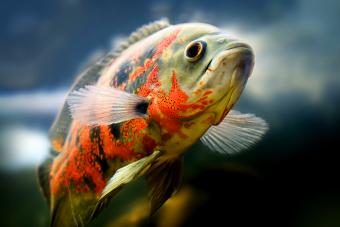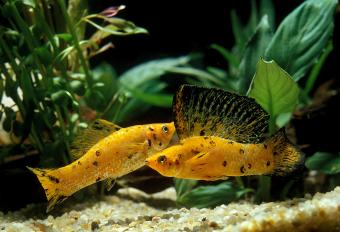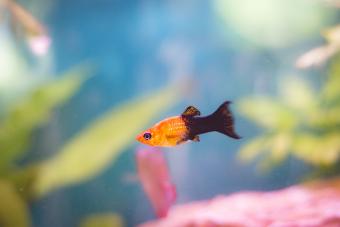
Are you thinking about getting an Oscar fish and wonder what they eat? In the wild, Oscar fish food consists of a varied diet of insects and crustaceans. Fortunately, you can mimic this diet through a combination of live foods and commercial diets. Find out which foods are best for these popular cichlids, as well as how much and how often to feed them to have healthy, robust Oscar fish.
Tips for Feeding Oscar Fish
Feeding your Oscar isn't as difficult as it may seem. The main thing to remember is that Oscars are omnivorous and require a diet made up of plant material and proteins such as shrimp, insects, and smaller fish. Remember to keep all these factors in mind when creating your Oscar's diet plan.
- Feed a combination of frozen food and commercial pelleted or flake food to ensure your pet gets a well-rounded diet. You should aim to feed about 80% pellets and 20% frozen foods and plants.
- Make sure you provide variety in their diet, as these fish will not eat the same items every week in their natural habitat.
- Observe your pet when they eat and remove any uneaten food two to three minutes after feeding, so it doesn't foul the tank.
- Always choose the highest quality food available.
- Making sure your Oscar has plenty of protein is also important to help them to grow correctly.
- Watch your pet's condition. If they look fabulous and seem active, alert, and healthy, you probably hit the right food combo and feeding schedule.
- If your Oscar doesn't eat the food you give them, you may need to try different options to find the items that they prefer.
Before frozen diets became widely available, it used to be common to feed Oscars live feeder fish. However, this often leads to your Oscar getting sick, so most aquarium experts recommend feeding frozen foods.
Live Foods for Oscars: Pros and Cons
Live food can be a great source of protein for your Oscar. However, feeding live foods also increases the risk your Oscar will contract a disease from the feeder species. You can still feed live food, but frozen or freeze-dried alternatives are safer and easier to deal with.
While Oscars eat many types of live foods, not all live foods are good for them. Always purchase your live food from a reputable pet store. Alternatively, you can raise your own if done in your home. Never feed insects taken from the outside, as these can be exposed to pesticides that can make your fish ill. Some live foods Oscars enjoy include:
- Black soldier fly larvae
- Crickets
- Grasshoppers
- Locusts
- Mealworm beetles (mature mealworms)
- Mealworms
- Waxworms
- Mussels
- Plankton
- Prawns
- Shrimp
- Small fish such as rosy red minnows and guppies. Avoid feeding goldfish.
Just as pellets come in different sizes, the size of the live food fed to your pet should be appropriate for the size of the fish eating it.
How Often to Feed Your Oscar Fish Live Food
If you choose to feed live Oscar food, you should add just one or two feeder fish to the tank at mealtime. Filling the tank with feeder fish and allowing your Oscar to feed at will can have some definite drawbacks for them, which include:
- Spoiling your pet so that they reject any other type of food
- An unbalanced diet, which can affect the fish's health
- Causing them to become obese, as small fish contain a lot of fat
- Causing a deadly ammonia surge by overcrowding the tank
The drawbacks for you include:
- The regular expense and inconvenience of stopping at the pet store for Oscar food
- The need for more frequent water changes and tank cleanings
- The possible need to medicate your fish if they catch a disease introduced to the tank by a feeder fish

Feeder Fish Cautions
Oscars need a balanced diet, so feeding them small fish is fine (minus the risk of introducing parasites or diseases to your aquarium) if you limit it to just a few fish a week. However, there are a few import tips to keep in mind.
- Always choose extremely healthy feeder fish. If these fish are sick or diseased, they can pass along diseases to your Oscar, such as the disease known as "hole-in-the-head."
- If you have difficulty getting healthy feeder fish, consider breeding your own. Guppies are prolific breeders and are often used as feeders.
- Feeder goldfish are not the ideal fish for an Oscar's diet because they are prone to disease since they are typically kept in overcrowded tanks. If you must feed goldfish, be very selective and never purchase from a tank that contains any sick fish.
It isn't easy to tell if feeder fish are healthy at first glance. Unless you specifically want to feed live fish and insects, choose a quality pellet and flake diet, and supplement with frozen products for cichlids.
Commercially Prepared Oscar Food
When shopping for commercial foods to feed your Oscars, look for foods designed for cichlids. A large selection of pellet foods are available, as well as foods that are frozen, freeze-dried, or canned. Pellets come in different sizes and shapes to offer a selection for juvenile and adult Oscars. When choosing pellets or other food for your pet, make sure the food is smaller than the fish's mouth.
Ideally, most of your Oscar's diet--around 80% --should consist of a commercially prepared flake or pelleted food. The remaining 20% can be frozen or freeze-dried treats.
Popular Commercial Foods for Oscars
This short list offers popular commercial food choices suitable for Oscars.
- Hikari Cichlid Gold: These are pellets that contain the necessary nutrients your Oscar fish needs, plus vitamin C. As a bonus, they also float, which helps you to see if the Oscar has eaten everything.
- Fluker's Gourmet Style Mealworms: Canned mealworms are a good option if handling live worms is unappealing to you, or you don't have access to a local shop that sells live ones.
- Tetra JumboMin Large Floating Sticks: This large floating pelleted food is in stick form designed to float at the top of the aquarium, which stimulates aggressive Oscar feeding behaviors.
-
JurassiPet EasiCricket Crickets: Canned crickets are similar to canned mealworms and are easier to feed than the live version and can be stored for longer.

- San Francisco Bay Brand Beefheart Plus: Beef heart is high in fat, so use only as an occasional treat.
- Hikari Tropical Food Sticks: These floating sticks are made with higher levels of carotenoids to promote Oscar coloration.
- Tetra JumboKrill: Freeze-dried shrimp is a good option for helping your fish to have more vibrant coloring.
Certain foods can actually bring out more of your Oscar's color, especially red tones. Look for foods with astaxanthin, which is present in krill shrimp. Peas have also been known to make their colors more noticeable.

Homemade Food to Supplement Your Oscar's Diet
Since wild Oscars will eat plant matter, you can chop up vegetables like cucumbers and zucchini and give them to your Oscar in small quantities. You can also feed them tiny amounts of frozen peas, shelled nuts (preferably tropical nuts), and even some fruits.
Common fruits given to Oscars include bananas, cantaloupe, oranges, and watermelon. Make sure if you feed fruit, you remove any seeds before feeding. Some Oscar owners may also feed them bread, which will not harm your fish but will not add anything nutritious to their diet.
How Much to Feed
Regardless of which foods you decide to feed your Oscar, it's important not to overfeed fish. Oscars have different needs based on their developmental stage.
Feeding Juvenile Oscars
If your Oscar measures less than four inches, it is a juvenile. These fish are fast growing, so smaller Oscars need to eat more often.
- For fish less than four-inches long: Feed at least three times each day until the fish's stomach looks somewhat rounded. This should be no more than three minutes per feeding session. Feed about three to four pellets at a time and wait until they are finished before you add more pellets.
- For fish at least five-inches long: Feedings can be cut back to twice a day, and you can start adding in live food like insects.
Frozen bloodworms and brine shrimp are suitable for baby Oscars.
Feeding Adult Oscars
Once an Oscar reaches a year of age, it is considered an adult. Adults should not be fed more than once a day. In fact, most adults do well when fed about four days a week. This gives the digestive track a day to clear completely before feeding resumes.

When Your Oscar Stops Eating
An Oscar can suddenly stop eating for a few different reasons, but it's usually a signal that something is wrong with their water quality or parameters. These steps may help resolve the problem:
- Test the water in the tank; the pH should be between 6.0 and 8.0.
- Try a different type of food. Oscars need variety in their diet.
- Trying doing a water change of 25 to 50 percent.
- If the water condition is fine, you've tried different food, and the Oscar still won't eat, stop feeding your fish for a few days. Usually, a healthy fish will start eating again when food is reintroduced.
If you take these steps and your Oscar continues to refuse to eat, talk to a veterinarian or your local aquarium shop expert.
Feed Your Oscar for a Long and Healthy Life
These simple suggestions can help your Oscar live a longer, healthier life. Always remember to focus on a primarily carnivorous diet, but don't forget to include some plant-based items. Make sure your fish does not become obese, as Oscars can be greedy eaters who will consume as much as you give them.







